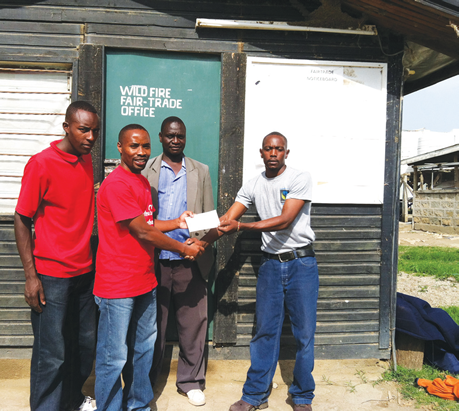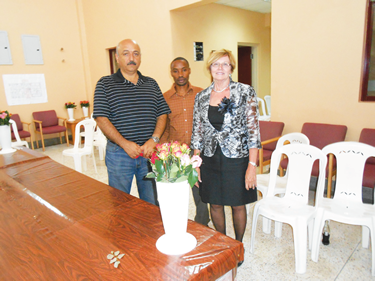 Naivasha flower farms that subscribe to Fairtrade (FLO) standards and are Fairtrade certified have completely changed the image of the District hospital maternity wing. Initially it was an image of 20 women in labour crowded in one central room quietly moaning and swaying until it is their time to go to one large delivery room to deliver in a cot-directly next to another mother giving birth. To date, it is one of the nicest African facilities handling over 500 deliveries monthly. Women and new borns can now enjoy privacy, respect and safety they deserve during their birth experiences.
Naivasha flower farms that subscribe to Fairtrade (FLO) standards and are Fairtrade certified have completely changed the image of the District hospital maternity wing. Initially it was an image of 20 women in labour crowded in one central room quietly moaning and swaying until it is their time to go to one large delivery room to deliver in a cot-directly next to another mother giving birth. To date, it is one of the nicest African facilities handling over 500 deliveries monthly. Women and new borns can now enjoy privacy, respect and safety they deserve during their birth experiences.
Currently, it has an 80 patient bed capacity in operation which includes 18 delivery beds.
Over the past 10 years there has been major developments in floriculture and horticulture in Naivasha. This has seen migration of people and their families to the area. Over 70,000 people are employed by the flower sector, with 70% of them being female. The mushrooming employment opportunities did not match with the healthcare facilities. The Naivasha District Hospital had to cater for a population of more than 400,000 people from Naivasha and its environs whereas it was designed with half the number in mind. This resulted into an impossible situation and something had to be done.
Driven by the desire to make a difference and passion for helping others, the Managing Director Panda Flowers Mr. Igal Elfezouaty embarked on a life changing experience. Coincidentally, Cindy Berkland, a women’s health care nurse practitioner from Omaha in the United States had come visiting and had volunteered at the Naivasha District Hospital. Igal had hosted her and they shared the days’ experiences. They both agreed the town needed a bigger and more equipped maternity.
After their discussion, Igal shared the information with his fellow investors in the flower sector who subscribe to the Fairtrade (FLO) standards and are Fairtrade Certified. The Fairtrade standards are designed to tackle poverty and empower producers in the poorest countries in the world. The standards apply to both producers and traders. It also provides an additional Fairtrade Premium which can be invested in projects that enhance social, economic and environmental development.
The Joint bodies of the flower farms namely: Panda Flowers, Oserian, Finlays Horticulture, Longonot Horticulture, Tulaga, Wildfire and Bigot Flowers agreed to step in and support the project. Slowly more partners joined, most of them suppliers to the flower farms.A threefold approach was born and a unique team of Private Industry (Flowers Farms in Naivasha), Friends of Naivasha USA (a group of 10 individuals committed to this project), and the Naivasha District Hospital which represents the Kenyan government and the local community.
An architect for the project was sourced and the District Hospital provided land. From there, the plan was to source for both monetary and equipment resources. The flower farms donated building materials mainly cement, plumbing supplies, windows, doors and other needed building supplies. More monetary donations from the farms, their suppliers and USA came in and the construction began. To date, Friends of Naivasha USA have raised around $1.2 million dollars towards the construction.
 Igal was not to rest until he achieved his goal. As a direct result of commercial relationship between DEG and Panda Flowers, He approached them with regard to the possible co-funding of the NWHCC, with specific reference to HIV education and Women’s healthcare issues. It was after considerable discussions that DEG decided to partner with Panda flowers in the form of a PPP (Public Private Partnership) in which DEG has co-financed with € 200,000 from public funds of the Federal Ministry for Economic Co-operation and Development.
Igal was not to rest until he achieved his goal. As a direct result of commercial relationship between DEG and Panda Flowers, He approached them with regard to the possible co-funding of the NWHCC, with specific reference to HIV education and Women’s healthcare issues. It was after considerable discussions that DEG decided to partner with Panda flowers in the form of a PPP (Public Private Partnership) in which DEG has co-financed with € 200,000 from public funds of the Federal Ministry for Economic Co-operation and Development.
Panda Flowers in turn agreed to match these funds in materials, supervision, and personnel. The project would not have taken off without the assistance of DEG, and their continued support .
In addition, other donors came in amongst them REWE group which donated a total of 10,000 Euros towards the construction.
This is no small project, and will have costed approximately Ksh 150 million upon completion. The saying “Time is money” means one thing, but “Time is Lives” is something entirely different. It’s very simple – the more time that goes by means more women and children die unnecessarily. Having completed phase one and two, the project is yet to be completed and more appeals are been made to well wishers to support. “So little money can do so much in Kenya”, says Cindy.
To date a total of fourteen, 40ft containers of medical equipments and supplies generously provided by health care providers in Omaha have been shipped. Some of the equipments already shipped in and installed include birthing beds, fetal monitors, infant warmers and isolettes, operating tables, anesthesia machines, ultrasound machine, surgical lights, commercial washer and dryers.
Properly thought out, professionally Designed, Well Executed, and Efficiently Managed, the Naivasha Women Hospital today boasts of a high-risk new born unit with isolettes and infant warmers for 20 infants, an isolation nursery, two surgical suites, 4 semi-private birthing rooms with two beds each, 2 delivery rooms with five beds each, 5 examination rooms, a lab, antenatal care and well baby clinic.
The hospital has introduced the first ever mammography and colposcopy machines in Naivasha.
The donors were only doing the infrastructure with the government maintaining the facility and offering human resources and stocking.
